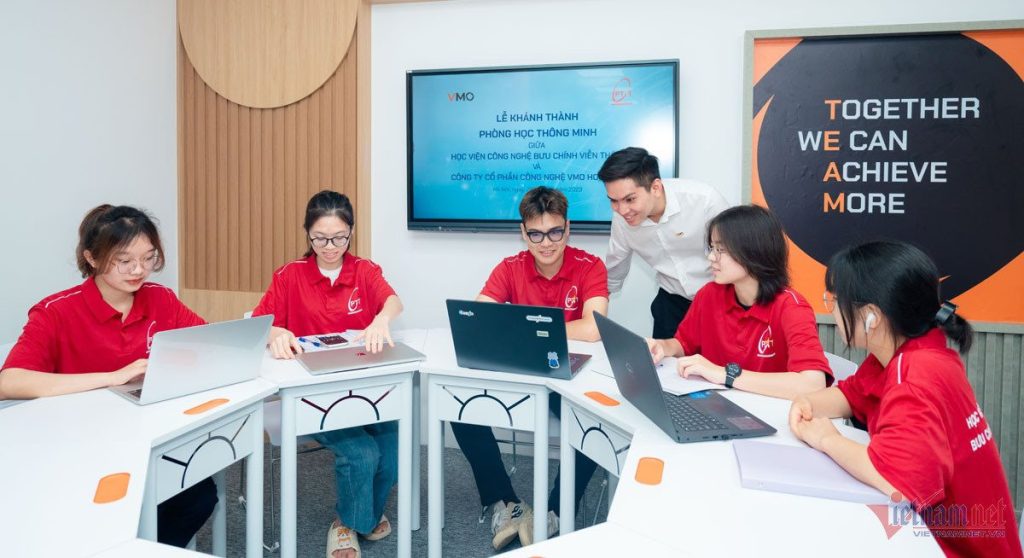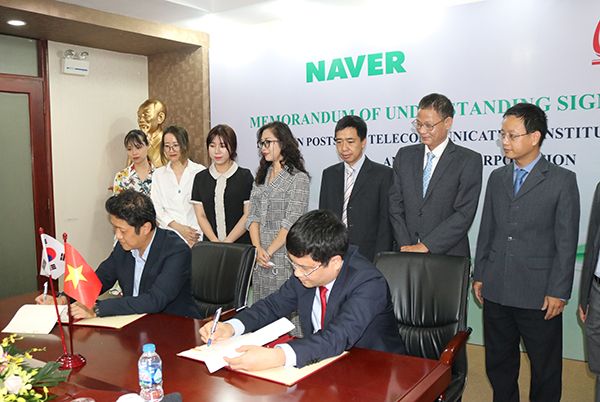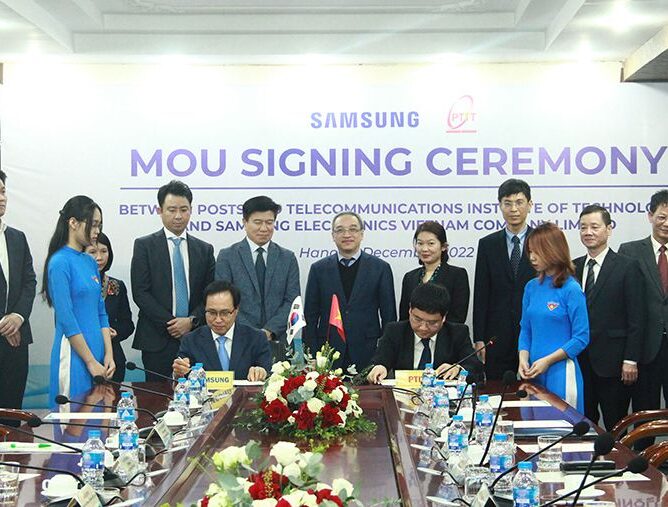With the first course of the Vietnam-Japan IT engineering program, Posts and Telecommunications Institute of Technology (BCVT) (PTIT) will enroll 100 students this year.

Providing high quality human resources for the Japanese market
In recent years, the labor market has become increasingly competitive. Although human resources in the IT field are increasing, high-quality human resources are still scarce.
Japan is a developed country with advanced technology. However, according to statistics from the Japanese Ministry of Economy, Trade and Industry, by 2030, the country will have a shortage of up to 789,000 IT engineers. Thus, the Japanese labor market is becoming an open market for developing countries.
As the top university in the group of Vietnamese universities in ICT training, in addition, PTIT is also a partner of many Japanese universities and enterprises, opening technical training programs. Viet Nhat IT Master is a suitable direction in the current situation.
Students studying the program will be equipped with knowledge and skills in accordance with Japanese ITSS regulations and engineering standards. After graduation, in addition to the IT Engineer degree granted by the Academy, students with a Japanese language level equivalent to N3 will be supported by PTIT to introduce jobs at Japanese businesses in Vietnam and businesses in Japan.
The difference in the Academy’s Vietnam-Japan IT Engineer Program is that the content of Japanese language modules is quite high, with 24 credits, trained by highly qualified lecturers from MEROS Language Institute and partners. work. Students will be trained in both English and Japanese foreign languages.
In particular, during the study process, students can transfer to study at the Academy’s partner schools if they meet the requirements from the units. Currently, some of the Academy’s partner schools are ready to accept students of the program to study in Japan such as universities: Hosei, Hokkaido, Tsukuba.
PTIT also informed that the salary after graduating from the program is up to more than 500 million VND/year. In addition, students are almost guaranteed a job after graduating from the Vietnam – Japan IT Engineer Program.
Students graduate from the program and achieve a level equivalent to the Japanese ITSS engineer standard after graduation; Ability to pass IT Passport and IT FE certification exams. These are two certificates that meet basic Japanese IT engineer standards. Possessing this certificate will have many advantages to help students add points when applying to IT companies, especially Japanese IT companies, or add points when applying for a Kodo visa/permanent residence visa in Japan.
Practical training program with Japanese business semester in Vietnam and Japan. Businesses will accompany students to make real projects and products, helping students get acquainted with the business environment and have unique products to do well for themselves. My CV later.
Students can also participate in a series of workshops with leading technology experts at Japanese businesses to help students gain more specialized knowledge and gain more understanding of the IT market in Japan; Participate in extracurricular activities every year, especially cultural exchange activities in Japan.
Training a generation of global IT engineers
In a time of globalization and internationalization that is increasingly spreading strongly in all areas of society, training students to study the Vietnam-Japan IT engineering program is one of the orientations for workforce development. PTIT global IT engineer.
The teaching staff participating in the implementation of the Vietnam-Japan IT Engineer Program all have master’s degrees or higher, graduated from universities in developed countries and are in the right field of study. In particular, lecturers who teach theory modules in the field of industry and specialized knowledge have PhD degrees, Professor and Associate Professor titles. These lecturers all have professional capacity and scientific research to meet the requirements of the training program; have teaching experience of 5 years or more; have effective teaching methods; Apply IT well in teaching and research.
Through the Vietnamese-Japanese IT engineer training program, students will be equipped with IT knowledge, especially in the field of software development, helping to create a generation of IT engineers capable of responding effectively to changing needs. Challenges and opportunities in the modern IT industry, especially for the Japanese labor market in particular and the world in general.
Some universities in Vietnam have been training Vietnamese-Japanese IT programs such as Hanoi University of Science and Technology with the Vietnamese-Japanese IT engineering bachelor’s training program HEDSPI; Vietnam Japan University, Hanoi National University with Bachelor of Computer Science and Engineering. Bachelor’s degree training programs.
PTIT opening the Vietnam-Japan IT engineering training industry with a commitment to providing high quality IT engineer human resources is a new point in line with the Academy’s development strategy for the period 2020 – 2025 with a vision to 2030 in particular and training system of universities in Vietnam in general. This is both a challenge and an opportunity for the Academy to diversify training methods and expand cooperation with leading universities in Japan in particular and orient international universities in particular. shared.
The program’s entry target is students who have graduated from high school or equivalent; Participate and be admitted to the regular university entrance exam – Combination of subjects: Math, Physics, Chemistry (block A00) or Math, Physics, English (block A01); or separate admission plans according to regulations announced by the Academy of Posts and Telecommunications Technology.
The training program is implemented over 4.5 years, including 8 semesters, of which 7 semesters are semesters to accumulate knowledge at the Academy and 1 semester is for internship at a real facility and implementation of a graduation project. . Encourage students to do graduation projects in English and Japanese.
Job positions students can take on after graduating as experts: programming (web applications, mobile applications, front-end, back-end, embedded software…); software testing, business analysis, system analysis, system design, software project management; experts in database and computer network design and administration; management and administration in the IT field; network security; data analysis; sales consultant, technical consultant and engineer bridging Vietnam – Japan in the IT field./.


